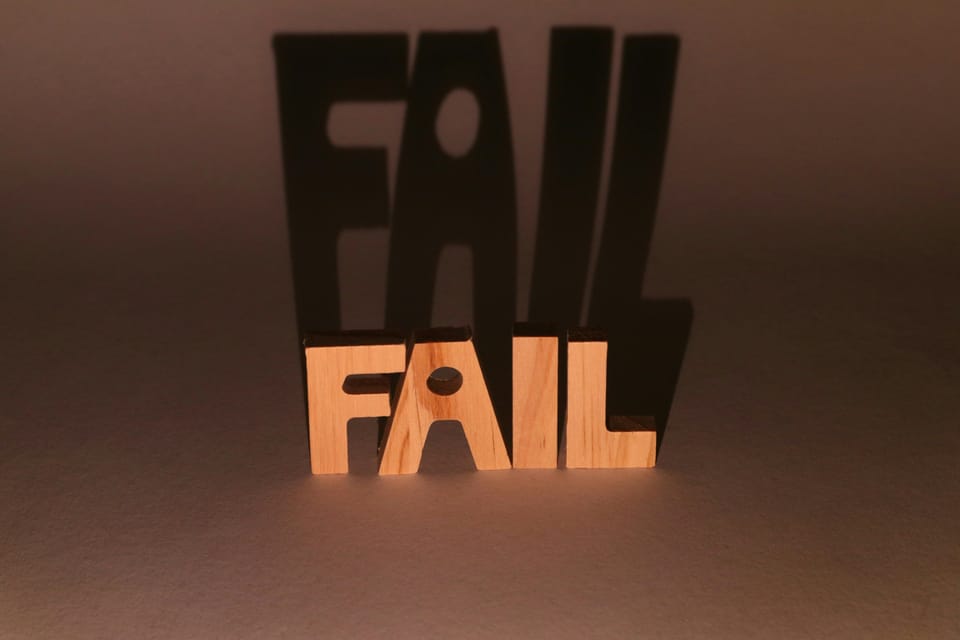You Might Not Be Failing Enough

What would you say if I asked you how you would get ahead of your competition and increase your success rate? Work harder? Work longer? Work with smarter/better people?
While all of the above are good ways of doing so, I bet not a single one of you thought out-failing everyone else could be included in the list, don’t worry, I don’t blame you.
As humans, we try to avoid failure at all costs, we have a natural tendency to lean away from any potential chances of experiencing it. We're not too fond of how it makes us feel or look.
However, having a higher rate of failure might just be what you need to make the progress you’ve been waiting for.
Failure = Progression
“If you want to double your success rate, double your failure rate” - Thomas J. Watson
What even is failure? Before we get into it I’d like to mention that the only thing I’d classify as true failure is not even trying to begin with.
But, for the sake of this blog, and due to the consensus of what failing means, I’m going to class “failure” as how everyone views it. Which is trying something, and ultimately not succeeding.
So failing is coming short, it’s trying something new or maybe trying the same thing at a higher level but not quite getting there. Essentially, it’s wanting a specific result but not managing to get it.
So how does this help us progress and get us ahead of others? Well, let's break down what a “fail” is.
You want something
|
You try to get it
|
You failed at getting it (where most people stop)
|
You learn what you did or didn’t do that prevented you from getting it
|
You take the lessons from the last failure onboard and address them
|
You try again, this time a bit better
This cycle continues until this part goes from “you failed at getting it” to “you got it”
Don’t get me wrong, it’s a lot simpler written down on a Google doc than it is in practice. Like I said, failing is not nice, we don’t like it, so it won’t be easy.
But it’s the fastest form of feedback, you get to brutally find out where you suck, and in doing so, you get the option of addressing your insufficiencies to suck a little less in the future.
In order to improve with anything, you need to first find out what needs improving, the fastest way of doing this is by failing, it’s by seeing what you’re capable of and getting a brutal reality check.
This is what we need, we can't fix what we don’t yet know needs fixing.
The other option, of course, would be to remain comfortable, maybe even delusional, after all, anyone could claim they are anything if they haven’t yet experienced the harsh reality check of failing.
You want something
|
You never even try to get it
This is where most people remain their whole lives, too afraid of the feeling that comes with finding out where they lack, but in doing so they never have the pleasure of finding out where they excel.

How To Fail More
If failing is trying but not winning then surely all that this section has to be is “try more” right?
Correct, but like most things, it’s never that simple.
Again, failing is not nice, in fact, it’s a kick in the teeth. It’s a direct blow to the ego. So, if we’d like to increase our failure rate, we must first have to become comfortable with being uncomfortable.
In a world where comfort is so readily available, discomfort now needs to be sought after, it has to be a continuous, conscious effort one makes regularly.
There are plenty of ways an individual can increase their tolerance of discomfort, but essentially what you need to do is teach yourself and your subconscious mind that you are capable of feeling pain/discomfort, and yet still persisting, still carrying on.
Choose something that’s good for you and difficult to do, something you can slowly increase the difficulty as you go along and preferably something you can do every morning.
Great, now that’s out of the way, you need to fail more. You can increase your tolerance for discomfort as much as you want, and although it will have a significant impact, it won’t directly prepare you for what failing truly feels like.
The only way to get used to failing is to experience failing.
Pick something you want to improve at or even something you’ve never considered trying before and go find out what you’re made of.
Change your relationship with failure. How powerful do you think someone that can experience failure and the only thing that happens to them is growth? Become that person.
Instead of valuing comfort, value its opposite. Because nothing and no one great ever comes from remaining comfortable, all that means is they’ve never bothered finding out who they could become.
Be the person who uses the discomfort of failure, not the person who gets used by it.






Member discussion